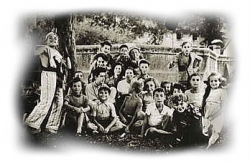
La Maison d'Izieu
A safe home for children
The German troops spent five days searching Dullin for Jewish children. Many years later, neighbors spoke of the armored vehicles combing the area, but finding nothing - Victor and Josephine had hidden Betty in a hollow kitchen table, used by French farmers to store flour.
It would have been a normal day for the children in both villages. Spring had come to the countryside, Nature's life had taken root again, the farmers were in their fields, the children, on holiday from school that day, were playing outside, the Germans, under the orders of Klaus Barbie, were in their trucks.
"God? How good You are, how kind and if one had to count the number of goodness’s and kindnesses You have done, one would never finish.
God? I ask you one thing only: make my parents come back, my poor parents protect them (even more than you protect me) so that I can see them again as soon as possible.
Make them come back again."
Transportation to Drancy will take place on 4/7/44. Signed Klaus Barbie."
The final destination was Auschwitz
Mid-morning, a squad of German ,soldiers led by.Gestapo officers and malice drove. from
Local milice had allegedly heard from Henri Bourdon, a farmer, that for the past year the village’s
largest house had been used as a school and refuge for Jewish children, aged from three to fourteen.
One of them, Theo Reiss, actually worked in Bourdon's fields. Until
then none of the villagers had been concerned for the
children's safety; the village was so remote from the war that there was no sense of secrecy about their presence.
None of them even knew at the time of the two Germai lorries which had pulled up in front of the house, or of the panic that followed inside. The school's director, Mirod Zlatin, was told by the Germans that the children were to be evacuated for their own safety.
Immediately suspicious, he tried to dissuade the Gestapo officers from moving the children; having failed, he told the children, to pack their belongings and climb into the lorries.
Julien Favet, a farmhand, was working in the nearby fields at the time. Usually one of the children brought his lunch and, when no one came, he returned to the village. As he walked into the drive, he saw the children filing out of the house. 'The Germans were loading the children into the lorries brutally, as if they were sacks of potatoes, most of them were frightened and crying. When they saw me, they all began shouting, "Julien! Julien!'"
As he moved
towards the children, a rifle butt was stuck in his ribs. In
the midst of the confusion and noise, there was a loud shout... Theo Reiss had tried to jump out of the lorry and. escape. 'They grabbed him,' remembers Favet, 'and started beating him with the butts of their rifles, kicking him in the shins.' Held back by another soldier, Favet was helpless.
'Then a German came up to me. I'm sure it was Barbie. For a moment he looked at me, spoke to another German, and then said, "Get out." I left, walking backwards.'
.